THE MIGHTY AMAZON RIVER, REGIA LILIES, AND MONKEYS
The most important thing about the Amazon jungle in my opinion, dear reader, is that amazing Amazon River itself. I knew the river was the life blood, so to speak, of South America, but I had no idea what a truly incredible and remarkable river it is, and I was certainly not prepared for my first view of it.
When we arrived at that bluff and I looked down at that river, all I could think was, “Oh good heavens, it is an ocean of moving mud!”
Honestly, that river was so wide that at times we could hardly see the other side of it, and it was just the purest chocolate brown color that it made me salivate for a milk chocolate bar!
Then our guide pointed out all the plants floating in the river and told us they are various kinds of water lilies. The jungle birds flying over the river drop seeds, he said, which then sprout right in the river if the sedimentation rate is high enough. Wow! Nature’s own water gardens.
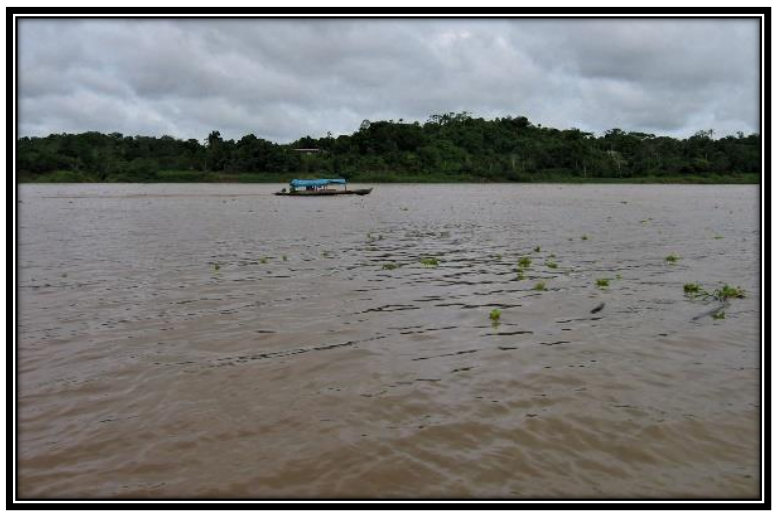
Of all the many intriguing things we saw and learned in the Amazon, none captivated me as did the river itself, which seemed so much like a giant living and breathing organism, one dependent not on the natural laws that bind all plants and creatures of the earth, but one that sets its own laws and rhythms that all other earthly inhabitants must follow.
As we walked down the many steps from the bluff to board the river boat that would take us to our jungle camp, our guide pointed out the high-water mark of 45 feet, telling us that one year the river rose
45 feet there. It seems that the seasonal flooding in the Amazon is more extreme than that in most other rivers on earth. During flood season, acres and acres of floodplain rainforest are inundated by as much as 40 feet of water, creating a giant continuous lake.
Most astonishing of all, perhaps, researchers now believe that this flooding of the Amazon causes an annual rise and fall of the earth’s crust itself in portions of South America that sink several inches during flood season and then rise again as the waters recede. Wow! Who knew?
Myrtle, of course, could not let that one pass. She whispered to me, “Ha! The earth moved! Take that, Hemingway! Who needs you?”
Flood season is a time for seed dispersal and for an abundance of food for the fish that eat fruit and seeds from trees. Most of these fish species are in the Amazon River. Flood season is also a time of hunger for predators whose hunting area is sharply reduced or who must live in trees during the flooding. It is also a time of hunger for predators of fish because fish have much deeper waters in which to hide.
Conversely, in low water season the very same streams and tributaries that were raging torrents during the rainy season may dry up altogether, leaving large islands and sandbars exposed and leaving fish stranded in ponds and shallow lakes, easy prey for their predators, who now have a time of plenty.
Another interesting phenomenon is that as dissolved oxygen levels in the waters of these inland floodplain ponds and lakes becomes low because of overcrowding by stranded fish, cold air coming from the Antarctic passes over parts of the Amazon and cools down the water on the surface.
That water then sinks to the bottom of the ponds and lakes, leaving a layer of decaying anaerobic sludge, which in turn releases methane and hydrogen sulfide that rise toward the surface of the water and cause massive fish die-offs. Who could ever imagine all this activity in a river?
We traveled about 50 miles up the Amazon by riverboat to our first camp on the Napo tributary. As we traveled, we saw many Riberenos along the river washing clothes, loading produce to go down river, fishing, and mending nets or canoes.
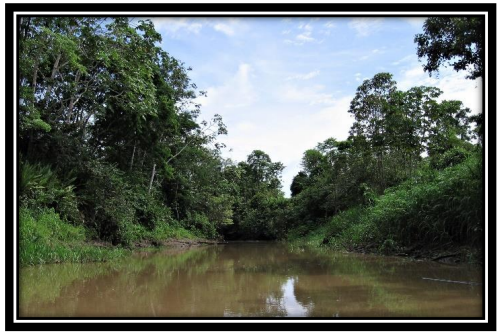
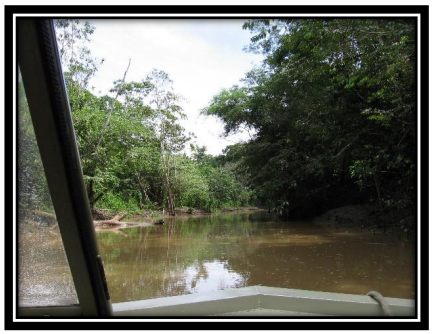
These Riberenos, or river people, who make their homes along the Peruvian Amazon are an ethnically diverse people whose ancestors include Europeans, natives from Amazon tribes, and mestizo, or mixedrace peoples.
As you can imagine, the Riberenos face all the challenges of enormous environmental changes as the river rises and falls each year. They have accordingly become a very adaptable and resilient people, able to live successfully along the river in all its stages and humors.
The river is for the Riberenos their means of travel, their source of food, and their source of water for cooking and bathing. In short, they find in the river everything needed for survival.
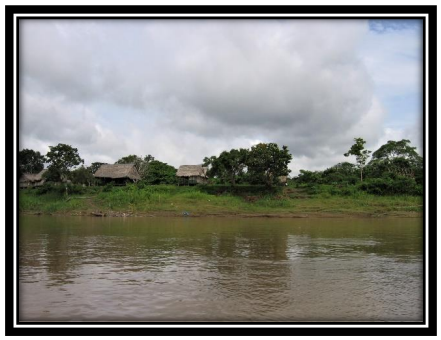
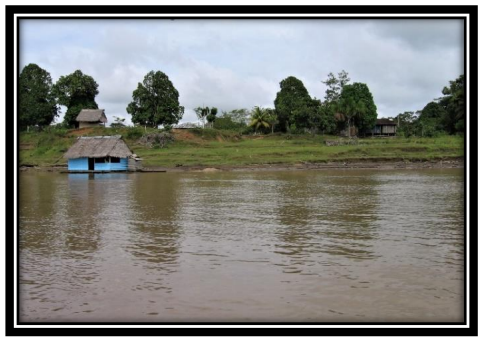
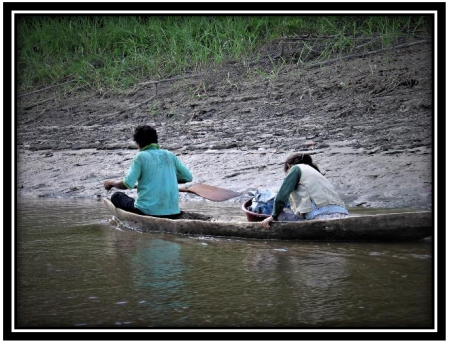
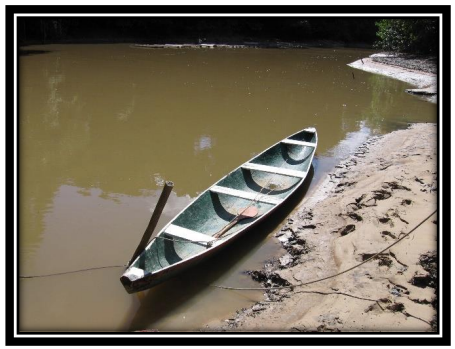
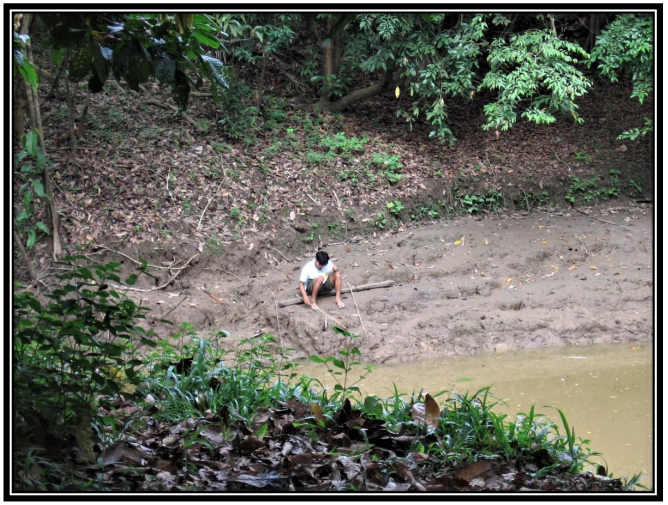
While we were in the camps, we used the river and its tributaries the same way.
Late one afternoon we traveled by small motorboat to Ananas Oxbow Lake to see the giant water lilies, the Regia Lilies.
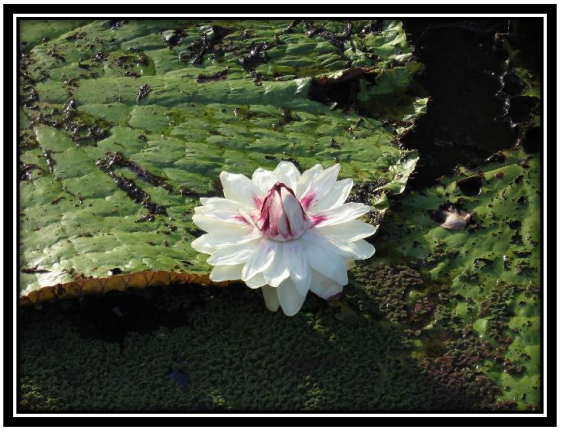
The Victoria Regia Lily is the largest water lily on earth and is found in the wild only in the Amazon rainforest.
To me the lily pads looked like giant custard ramekins, six feet in diameter and perfectly round, with up-fluted edges. Seven of them were blooming into spectacular large white blossoms with pink and red blushes in their centers. These lily pads can hold a small animal like a rabbit, our guide told us. An old tribal custom was to take a newborn baby a few days old, place the baby on a lily pad, let it sink up to its ears, and if the
baby did not sink completely, the baby would become a leader of his or her people.
It was a kind of baptism, said our guide.
And I know that you, dear reader, are already wondering the same thing Myrtle and I wondered: what happened if the baby kept sinking? Did the tribe just leave it there to sink slowly to the bottom of the lake in those six to eight feet of murky water?
I did not want to ask our guide, because Myrtle and I were at that moment in a sort of détente with him and I was afraid to risk upsetting that peace accord.
So I just sat there and thought about what happened to those babies and whether the water below us was a perfect graveyard of tiny little bones. And I took some photos.
Meantime Myrtle was hatching another vile little scheme.
As I was positioning my camera for that perfect shot of the Regia Lily bloom, one of the women in our boat cried out, “Your backpack is sinking! Oh dear, it’s sinking!”
I whipped my head around, nearly dropping my camera, and saw my backpack sitting on one of the lily pads, where, indeed, it was slowly sinking!
Myrtle was calming watching it and checking her stopwatch.
I took a diving leap for my backpack, landing with a thud on the side of the boat and wondering if I had broken a few ribs.
But my long arms did save the day, AND my backpack.
Then I could not help it – I really yelled at Myrtle. “You took MY backpack for your scientific experiment?!!! What about your OWN backpack?!!!”
She calmly answered, “Because your backpack was closer to exactly ten pounds, which meant I did not have to mess with fractions for my calculations.”
Sure enough, when I looked down, there on the bench next to her was a small luggage scale, another of the millions of handy items to be found in her purse, I guess.
Anyway, dear reader, we never did learn what happened to those babies. Your guess is as good as mine.
I was too busy trying to dry off my backpack and see what I could do about the soggy stuff in the bottom of it.
Our guide, bless his heart, tried to return us to the quiet, contemplative atmosphere these lilies inspire, and as the sun started to sink behind the jungle trees, he told us a lovely Amazon legend about the giant Regia Water Lilies.
For many years the young girls of a nearby tribe would sit on the banks of the Amazon River singing, staring at the moon and the stars, and dreaming about a better life. If only they could be a moon or a star! One day the youngest girl among them, Naia, decided to climb a tree to see if she could touch the moon. She could not.
The next day she and her friends climbed the highest hills they could find, but again they were not successful in reaching the moon. They thought that if only they could touch the moon, they would be turned into the kinds of girls they wanted to be.
The next night Naia walked alone to the riverbank and stared so long at the reflection of the moon in the water that she went into a trance. She thought the moon had come to the river to bathe, and she jumped into the river to join the moon.
She was never seen again.
The moon was immediately overcome with sadness and guilt and turned the young girl into a giant water lily that could capture and hold the light of the moon. So Naia lives on perpetually as a Victoria Regia Giant Water Lily.
Well, that sobered us all up, and we were quiet on the way back to camp. Even Myrtle had nothing to say.
Another excursion we took on the river early one morning was to Monkey Island, a remote 2 ½ square mile island preserve dedicated to saving endangered monkeys. The entire island is the home of the monkeys, where they run free.
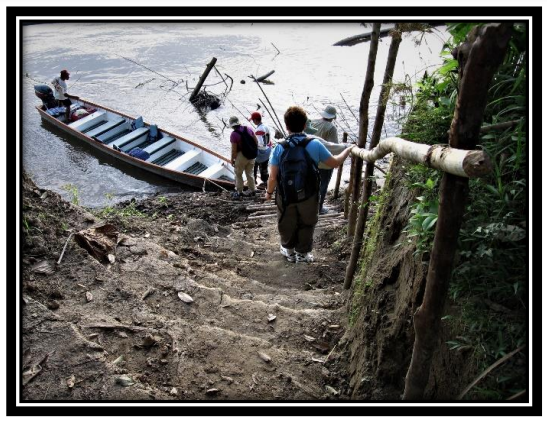
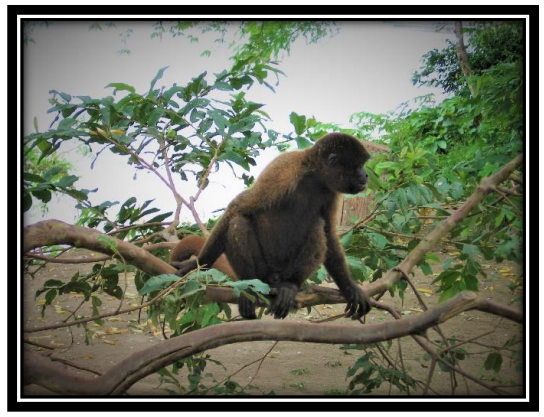
Our guide had told us we would see the Spider Monkey, the Wooly Monkey, the Red Uahari Monkey (endangered), the Titi Monkey, the Saddle Back Tamarin, and the Golden Mantle Tamarin.
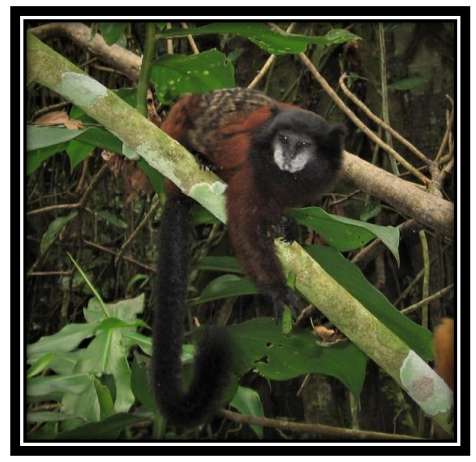
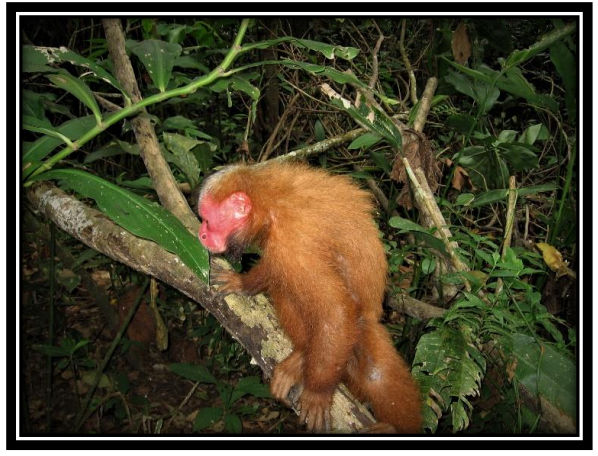
After our boat tied up at the dock, we climbed up those long wooden stairs to reach the bluff, where a dirt path meandered off into the jungle.
Almost immediately when I stepped off the stairs a wooly monkey jumped onto my shoe, grabbed my legs, looked up at me and screeched, wrapping its tail around my legs for good measure.
Myrtle piped right up: “I think that monkey has an exemplary sense of fashion, don’t you? Your shoes are blue, the monkey is brownish gray. The monkey obviously knows that blue would look very good on him.”
Well, I’m not saying I’m perfect or anything, mind you. It is true that what I really wanted to do was bop Myrtle because I was still annoyed about the backpack episode. So maybe I did take out that annoyance on that poor defenseless little monkey. But I hope you will give me some credit for at least abstaining from bopping Myrtle? Thank you.
Now, I am pretty sure this was one of those times when I did not do exactly the right thing, but that monkey simply WOULD NOT LET GO!
The whole group started walking down the path into the jungle, and I kept saying “Shoo, monkey, Shoo monkey.” But that monkey did not understand English, I guess.
It just kept looking up at me and screeching while holding me in lock-down. Myrtle, of course, just stood there alternately clucking like a chicken or tsking stupidly.
When the tail of our group rounded the corner and disappeared, I started to picture the headlines “The remains of two Gringas have been found on Monkey Island, where it is believed they got lost and were eaten by crocodiles in the Amazon River.”
THAT made me a little mad because I had on my favorite safari pants. So, I grabbed onto Myrtle for balance, got one foot securely under the monkey’s bottom and with one mighty heave I managed to dislodge that little critter. He landed only a few feet from us and immediately started loping our way again. We took off at a run.
After we caught up to our group, we discovered that another monkey had latched onto another member of the group, and the guide calmly gave the monkey a banana. The monkey immediately released its grip on the human and at lightning speed clambered up the nearest tree where it gobble the banana in record time, before any other monkeys could take it.
Now where was the guide when I needed him?
Then he proceeded to inform us in a bored voice, at least it seemed so to me, that on Monkey Island you should always carry some bananas but keep them out of the reach of the monkeys.
Does that instruction sound like an oxymoron to you, dear reader?
I meekly spoke up, “But how do you do that?”
The guide did not even acknowledge my question, I am sorry to say. I guess I was still in the doghouse.
But now you tell me, dear reader, just how are you supposed to keep the bananas away from the monkeys if they gang up on you?
I had visions of being overrun by swarms of mad monkeys tearing at my backpack and ripping off my clothes because I had the smell of banana on me.
With a shudder I decided that I probably should not visit another monkey island.
Oh boy, wouldn’t it be my luck to become reincarnated as a monkey next time? Yikes. Right then I decided I would put in my request that if I had to be reincarnated as an animal, I would like to be a panda.
To be continued…

